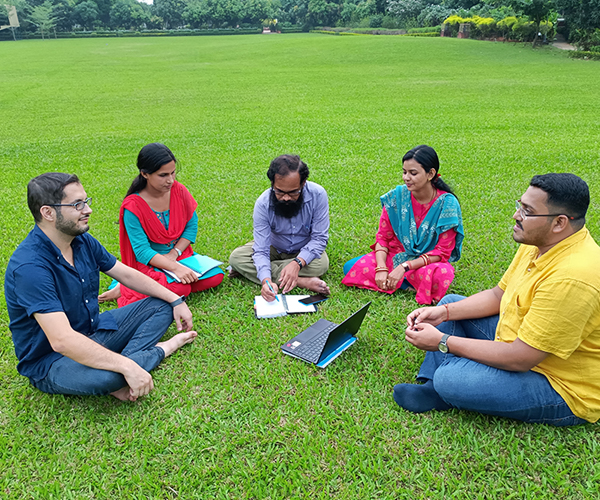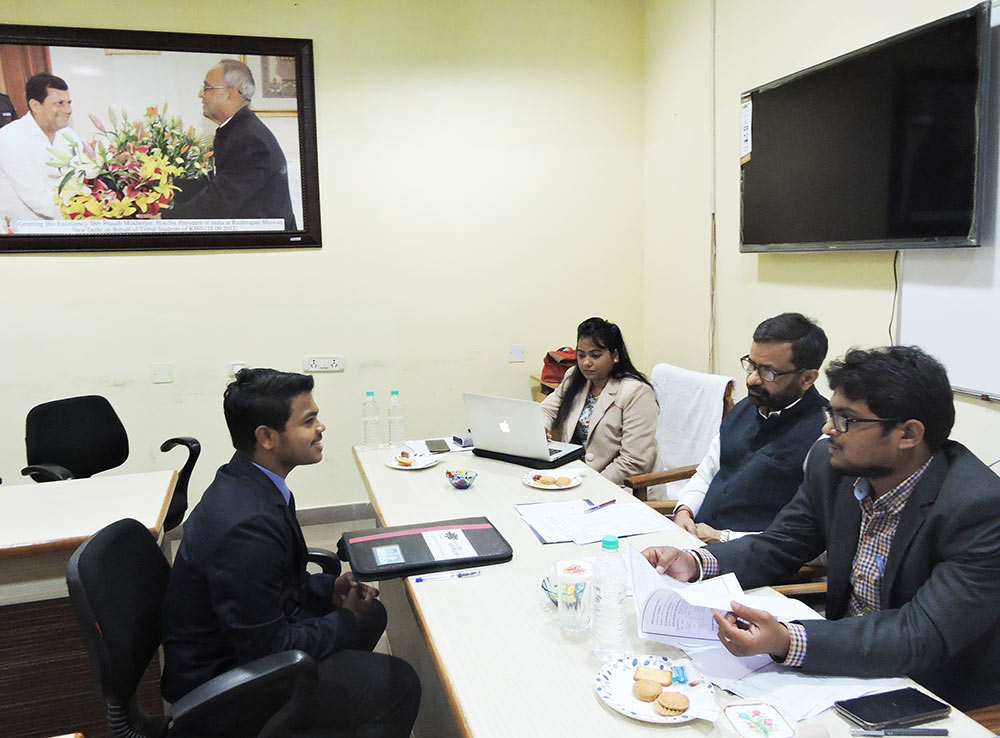MBA (Rural Management)
About the Course:
The MBA (Rural Management) is the flagship programme of KSRM successfully continued since 2007. This Programme is judiciously designed in balance with classroom and field based experiential learning. The classroom segment spreads over 64 credits and the fieldwork segments (at three different slots) of 28 credits across four semesters over two years.
KSRM has made ‘experiential learning’ as one of the core focuses of our MBA (RM) curriculum. It allows students to learn from live situations, which are more complex than what can be created in classroom. Accordingly, students could spend little more than 30 per cent of the total course credits in the field with our partner organization. The students have the flexibility to choose among the various projects being offered by our partner organization. The broad areas of fieldwork includes: agribusiness, microfinance, Rural finance, banking & marketing, climate change, disaster and natural resource management, livelihoods, health, education & Corporate Social Responsibility and rural entrepreneurship. On the other hand, the faculty members do effectively uses variety of pedagogical tools to actively engage students.

Program Outcomes (POs)

- Apply knowledge of development and management theories and practices to impart rural social, political and economic development and solve rural business problems.
- Foster analytical and critical thinking for evidence/data based decision making for rural issues.
- Develop value based leadership capability to serve rural areas.
- Ability to understand, analyze and communicate global, economic, legal, and ethical aspects of rural development and rural business.
- Competent to lead themselves and others in the achievement of organizational goals, contributing effectively to a team environment in the rural context.
- Adept in planning, incubating and nurturing innovative rural business and social enterprises.
- Prowess to design, implement, monitor and evaluate strategic projects, programmes and policies for rural development.
Programme Design
| Module & Type | Title of the Course |
| Compulsory (Classroom) 18 credits | Micro Economic Analysis |
| Accounting for Managers- | |
| Rural Production and Livelihoods | |
| Quantitative Techniques | |
| Rural Society and Polity | |
| Development Research Methods | |
| Managerial Analysis and Communication | |
| Marketing Management-I | |
| Development Perspectives | |
| Field/Internship | Village Study Segment (VSS) |
| Compulsory (Classroom)-14credits | Macro Economic Analysis |
| Finance for Managers | |
| Marketing Research | |
| Organizational Behavior | |
| Management Information Systems | |
| Marketing Management-II | |
| Natural Resource Management and Climate Change | |
| Field/Internship | Management Traineeship Segment (MTS) 1 |
| (Classroom) 12 credits | Policy and Programme Interventions for Rural Development |
| Development Theory and Practice | |
| Rural Finance and Commercial Banking | |
| Management of Co-operatives & FPOs | |
| Microfinance | |
| Project Management | |
| Optionals ** (limited to 4.0 credits) | Agri-Business Management |
| Rural Marketing | |
| Commodity Trading and Derivatives | |
| E-Business for Rural Enterprises | |
| Operations Research | |
| Agri-Input Marketing | |
| Disaster Management | |
| Gender and Development | |
| Field/Internship | Management Traineeship Segment (MTS) 2 |
| Compulsory (Classroom) 13 credits | Human Resource Management & Development |
| ICTs for Development | |
| Sustainable Development | |
| Strategic Management | |
| Legal Environment and Business Ethics | |
| Innovation in Rural Development and Enterprises | |
| Modern Trends in Yoga and Sports Sciences | |
| Optionals ** (limited to 4.0 credits) | CSR Management |
| International Trade in Agriculture | |
| Strategic Interventions in Development Organizations | |
| Procurement and Supply Chain Management | |
| Managing Agricultural Value Chains | |
Placements opportunities
The course will have direct relevance to the following sectors and sub sectors:
Development Sector
- Non Government Voluntary Organization
- Government Societies
- International Development Organization
- Indian and International Funding Agency
- CSR Wings of Public and Private Organizations
- Cooperatives and FPOs
Food Processing Industry
- Dairy
- Fruit and Vegetable processing
- Chicken & Meat Processing
Retail Industry
Agri. Input Industry
Cooperatives and FPOs
E-Commerce
Financial Services
- Private Sector Banks
- Public Sector Banks
- Small Finance Banks
- NBFCs working in Agri. and Rural Sector
- Micro Finance Institutions
Agri. Commodity Trading Sector
Agri. Warehousing Sector
Agri. Export Houses


